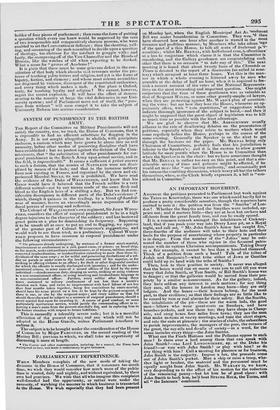AN IMPORTANT MOVEMENT.
AMONGST the petitions presented to Parliament last week against the Taxes on Knowledge, there was one which could hardly fail to produce a pretty considerable sensation, though the reporters have omitted to note it : the petition was from the " Smiths" of Lon- don ! Whether the Smyths and the Smythes were included, ap- pears not; and it matters little—they are at best but suckers and offshoots from the great family tree, and can be easily spared. It is a common remark amongst the inhabitants of Cockney- land, that if you push your way into Drury Lane pit, on a Royal night, and call out, " Mr. John Smith's house has caught fire," three-fourths of the audience will take to their hats and their heels for the purpose of ascertaining whose property in particular is in danger. From the number of the " Johns" may be esti- mated the number of those who rejoice in the favoured patro- nymic with its various Christian accompaniments. Taking Drury as a fair example, it cannot be less than a hundred thousand. Think of a petition from such a band! Talk of the tribes of Judah and Benjamin !—what tribe either of Jews or Gentiles could hold up its head with the tribe of Smiths?
Then, look to their position in society. It never was alleged that the boxes would rise en masse were you to call till you were weary that John Smith, or Tom Smith, or Bill Smith's house was in danger ; or that the galleries would be moved from their pro- priety by a similar announcement. As for the gallery, indeed, they have seldom any interest in such matters: for any thing they care, all the houses in London may burn—they are only lodgers. And the boxes —their houses belong, for the most part, to their creditors; so that their feelings are as little like to be roused by vain or real alarms fur their safety. But the Smiths, the inhabitants of the pit—these are the warm lads, the good men— fellows who wear great-coats on Sundays, and have breeches-pockets, and use them too; they have shops in Cheap- side, and snug boxes four miles from town; they are the men that make motions at vestry meetings, and time the short stages, and rate the cads at pleasure; the oracles of clubs, the subscribers to parish improvements, the managers of the poor, the censors of the great, the say-alls and do-alls of society—in a word, for the name includes every thing—the John Smiths. What can the Finch Hattons and the Pelhams oppose to such men ? Is there ever a lord among them that can speak with John Smith ?—can Lord LONDONDERRY, ay or the Duke his friend?—or vote with John Smith? or play with him? or do any thing with him ? Call a meeting for pleasure or for business, John Smith is the majority. Impose a tax, the proceeds come out of John Smith's pocket. Man a ship or raise a troop, whe- ther light or lumber, the materiel and the personnel must be equally sought from John Smith. Mr. WAKLEY is, we know, very desponding as to the effect of his motion for the reduction of the remaining penny—but let him be of good cheer: with John Smith to back him, hell beat SPRING Rica, the Tories, and all "the Interests" combined.


























 Previous page
Previous page